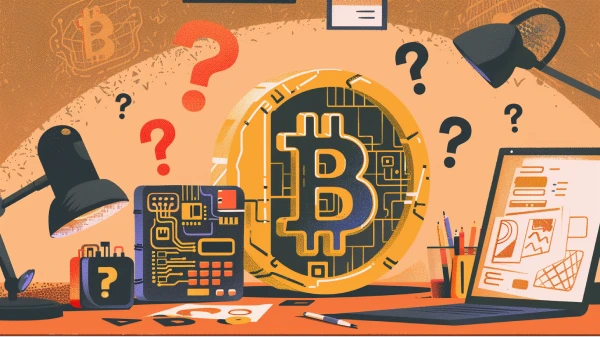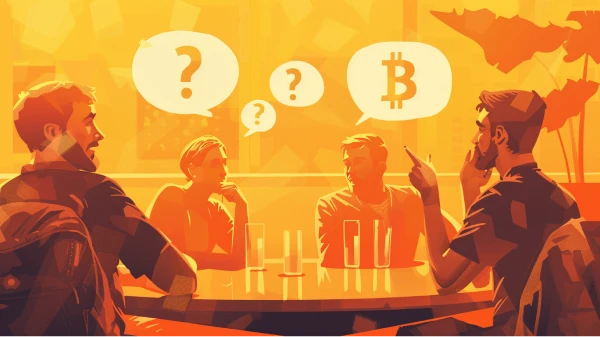There has long been speculation that governments might attempt to ban Bitcoin**,** which operates independently of government control and directly competes with traditional fiat currencies.
Over the years, Bitcoin has faced criticism from various government officials, and some countries have imposed restrictions or outright bans on its use. Despite these efforts, no ban has successfully halted Bitcoin’s growth or adoption.
However, governments have clear incentives to suppress Bitcoin, particularly due to its decentralized nature and potential to undermine centralized financial control. This could lead to more aggressive and coordinated efforts to regulate or restrict Bitcoin in the future.
Why Would Bitcoin Be Banned?
Bitcoin Is Private
One reason governments might ban Bitcoin is its private nature. While Bitcoin is not anonymous, it can enable great privacy if used properly, allowing users to avoid the surveillance of the traditional financial system. This makes it hard for governments to track and surveil their citizens.
Bitcoin Is Censorship-Resistant
Bitcoin transactions are practically impossible to reverse or block, meaning that any individual can send bitcoin to any other individual. Bitcoin is inconvenient for governments when compared to the traditional financial system, where accounts can easily be frozen or emptied.
Bitcoin Threatens Weak National Currencies
Governments may ban Bitcoin because it threatens the value of their fiat currencies. Governments maintain significant control over large populations and the economy by forcing their citizens to use a currency that only they can control. Their ability to spend and service debts is also dependent on their ability to print new money. When a superior currency like Bitcoin exists, it hinders that ability.
– Nigerian Senator Sani Musa
In the case of the United States specifically, the US government can exert significant leverage over foreign countries because almost all countries use the US dollar. The United States imposes sanctions on many countries and individuals and relies on its control of oil markets and the settlement layer of fiat currencies to enforce these sanctions. Bitcoin allows states and individuals to potentially avoid these sanctions entirely.
– US Representative Brad Sherman calling for a ban on Bitcoin
Examples of Bitcoin Bans
Several nations have attempted to ban Bitcoin, including China and India, the two largest countries in the world. None have been fully successful.
China’s Bitcoin Ban
China has “banned” Bitcoin several times over the last decade. Nevertheless, a majority of the world’s Bitcoin mining and many prominent Bitcoin exchanges operate openly in China. This is due to the enormous economic benefit Bitcoin miners provide to their local governments in the form of taxes. Bitcoin miners also balance China’s electrical grids by using excess hydroelectric energy during the rainy season. This has made truly eradicating Bitcoin not only difficult but economically punishing and politically undesirable.
India’s Bitcoin Ban
In India, financial regulators attempted to ban Bitcoin, but the ban was deemed unconstitutional by the supreme court in 2018.
Nigeria’s Bitcoin Ban
In early 2021, the Central Bank of Nigeria (CBN) banned the exchange of Bitcoin and forced bank accounts involved with Bitcoin to close. This decision was partially a result of the CBN’s poor handling of their own currency, which inflated 16% in 2020 alone, driving many citizens to adopt bitcoin. The Nigerian population is familiar with using Bitcoin for remittances and fundraising for protests as well. Nigeria’s Bitcoin ban triggered more demand for bitcoin: peer-to-peer volume rose and a significant premium developed.
Can a Government Successfully Ban Bitcoin?
So far, no government has successfully eradicated or even reduced Bitcoin usage in their country. However, some Bitcoin critics and even supporters claim more sophisticated and motivated attempts at a Bitcoin ban may occur in the future.
There exist two distinct possibilities for a Bitcoin ban. A government may attempt to ban the exchange of bitcoin, while accepting that they cannot take down the network itself. Alternatively, a government, or coalition of governments, may attempt to destroy the entire network and stop all Bitcoin activity.
Banning the Exchange of Bitcoin
If a single government banned Bitcoin, their first target would be centralized Bitcoin institutions, such as lending platforms, brokerages, and exchanges. These institutions usually comply with financial services laws and would be vulnerable to legal action because of their public presence and reliance on the traditional financial system. A successful shutdown of centralized institutions would choke access to Bitcoin for a majority of users, and could potentially crash the price of bitcoin, depending on the country’s share of the Bitcoin economy.
The results of a ban depend on the determination of users. If users submit and give up on Bitcoin, the ban could be widely successful. As we saw in Nigeria however, that is not always the case. If users turn to decentralized, peer-to-peer platforms to obtain and use bitcoin, the Bitcoin economy will continue to flourish.
Banning the Bitcoin Network
Shutting down the entire Bitcoin network is a significantly harder task for governments. Bitcoin is a global network that uses the internet to relay transactions. So long as an individual can establish a connection with another Bitcoin node, they can broadcast a transaction and continue using Bitcoin. Bitcoin nodes are distributed across the globe, so even if a government eliminated all nodes in their own country, they would have to prevent their citizens from connecting with nodes in other jurisdictions as well, a near-impossible feat.
A Bitcoin ban would likely resemble America’s prohibition of alcohol in the 1920s, which drove alcohol use underground but did not reduce its usage. The benefits of Bitcoin will incentivize widespread use even under discouraging legal conditions.
A Global Bitcoin Ban
Since individual governments would have a difficult time banning Bitcoin, it is possible that a coalition of governments could cooperate to ban Bitcoin simultaneously. If the world’s major powers collaborated, they may be able to destroy the major Bitcoin exchanges, brokerages, and lending platforms.
In order to successfully ban Bitcoin, governments would also have to disrupt the development and social networks surrounding Bitcoin in order to hinder the distribution of Bitcoin’s source code. Finally, governments could pressure Internet Service Providers (ISPs) to track and restrict Bitcoin activity, harming Bitcoin nodes’ ability to interact over the internet.
All of these actions are well within the abilities of governments. The combination of these attacks would be very difficult to sustain, especially with the infrastructure of decentralized Bitcoin exchanges being so underdeveloped. As decentralized exchanges develop and gain liquidity, Bitcoin will become more resilient to a ban, as users have a backup option in case their regulated sources for bitcoin are banned.
The practicality of the world’s major powers collaborating to destroy Bitcoin simultaneously is questionable. For example, the United States and European Union have a stronger rule of law than Russia or China. For all four powers to enact the same policy would require significant political and legislative shifts in the United States and Europe.
Will Bitcoin Be Banned?
Even if it is technically possible to ban Bitcoin, there are several compelling reasons why governments might not want to take that route.
Political Support for Bitcoin
Within governments, some officials will own bitcoin themselves, or know people who do, making them partial to protecting their investment. In the United States, many members of Congress publicly profess their support for Bitcoin. As Bitcoin gains adoption, this will become more common, making anti-Bitcoin legislation harder to pass.
In democracies, as more voters adopt Bitcoin, they may also elect candidates who are favorable for Bitcoin, or at least opposed to an outright ban.
Jurisdictional Competition
When one jurisdiction bans Bitcoin, it incentivizes Bitcoin businesses and users to move their activities to another jurisdiction. The more tolerant jurisdictions will see economic growth and capital inflows, while more oppressive regions experience economic contractions.
This is already apparent in the United States, where some states such as Wyoming and Kentucky have made Bitcoin businesses welcome, while states like Washington and New York have not.
The High Cost of Banning Bitcoin
The process of banning Bitcoin would be extraordinarily expensive, even for governments. Additionally, it would trigger a collapse in the price of Bitcoin and a large loss of jobs as Bitcoin-related businesses closed their doors. All of these factors would result in tax revenue losses for governments. While these losses might be insignificant today, they are growing rapidly as the Bitcoin industry expands and the price of bitcoin rises.
If Bitcoin users or even businesses refuse to comply with a government’s ban, the cost of direct enforcement could further balloon.
Banning Bitcoin Self-Custody
A ban on Bitcoin self-custody might carry many of the same benefits for governments, without the high costs and political and economic drawbacks of an outright ban. Today, a vast majority of Bitcoin users acquire their bitcoin from regulated exchanges and brokerages. New regulation could convince institutions to stop allowing withdrawals or convince users to stop demanding to self-custody their bitcoin.
Once a significant majority of bitcoin are held by regulated entities and not self-custodied by individuals, governments will be able to trace most Bitcoin payments almost as easily as they track traditional payments. If a small enough percentage of Bitcoin users continue to self-custody their bitcoin, their bitcoin could be considered “tainted” or even illegal by law enforcement.
However, if a large portion of bitcoin remained in self-custody, an independent Bitcoin economy could emerge, requiring no connections with the traditional financial system. This would make regulation and surveillance extremely difficult.
Conclusion
It is easy for detractors to make sweeping statements about how Bitcoin will be banned by governments, but in reality this is a nuanced discussion. Banning software is incredibly difficult and would encourage developers to continue to make Bitcoin activity invisible to onlookers. As time progresses, more people within governments will own bitcoin themselves, or have family members who do.
A Bitcoin ban is just one of many concerns users have when deciding to buy Bitcoin or not. Fortunately, there are answers to these concerns.
Notice: River does not provide investment, financial, tax, or legal advice. The information provided is general and illustrative in nature and therefore is not intended to provide, and should not be relied on for, tax advice. We encourage you to consult the appropriate tax professional to understand your personal tax circumstances.Key Takeaways
- Governments may have a desire to ban Bitcoin to maintain control over their citizens and their currency valuations.
- Government bans on Bitcoin have failed thus far, most prominently in China and Nigeria.
- A coalition of governments acting simultaneously might be able to ban Bitcoin and fatally damage the network.
- Governments, especially democracies, have political and economic incentives not to ban Bitcoin. These incentives will grow stronger as Bitcoin gains adoption.


